Organisational Behaviour: Culture, Motivation and Power at 4Com PLC
VerifiedAdded on 2020/12/10
|17
|5423
|311
Report
AI Summary
This report examines the organisational behaviour of 4Com PLC, a UK-based communication service provider. It delves into how organisational culture, politics, and power influence individual and team performance, referencing Charles Handy's cultural typologies. The report explores content and process theories of motivation, including Maslow's hierarchy of needs and motivational techniques. It also analyses effective team dynamics and the impact of organisational politics. Furthermore, it discusses different forms of power (reward, legitimate, expert, and coercive) and their effects on employee behaviour. The report concludes by emphasizing the importance of these factors for 4Com PLC's success, providing insights into fostering a positive and productive work environment.
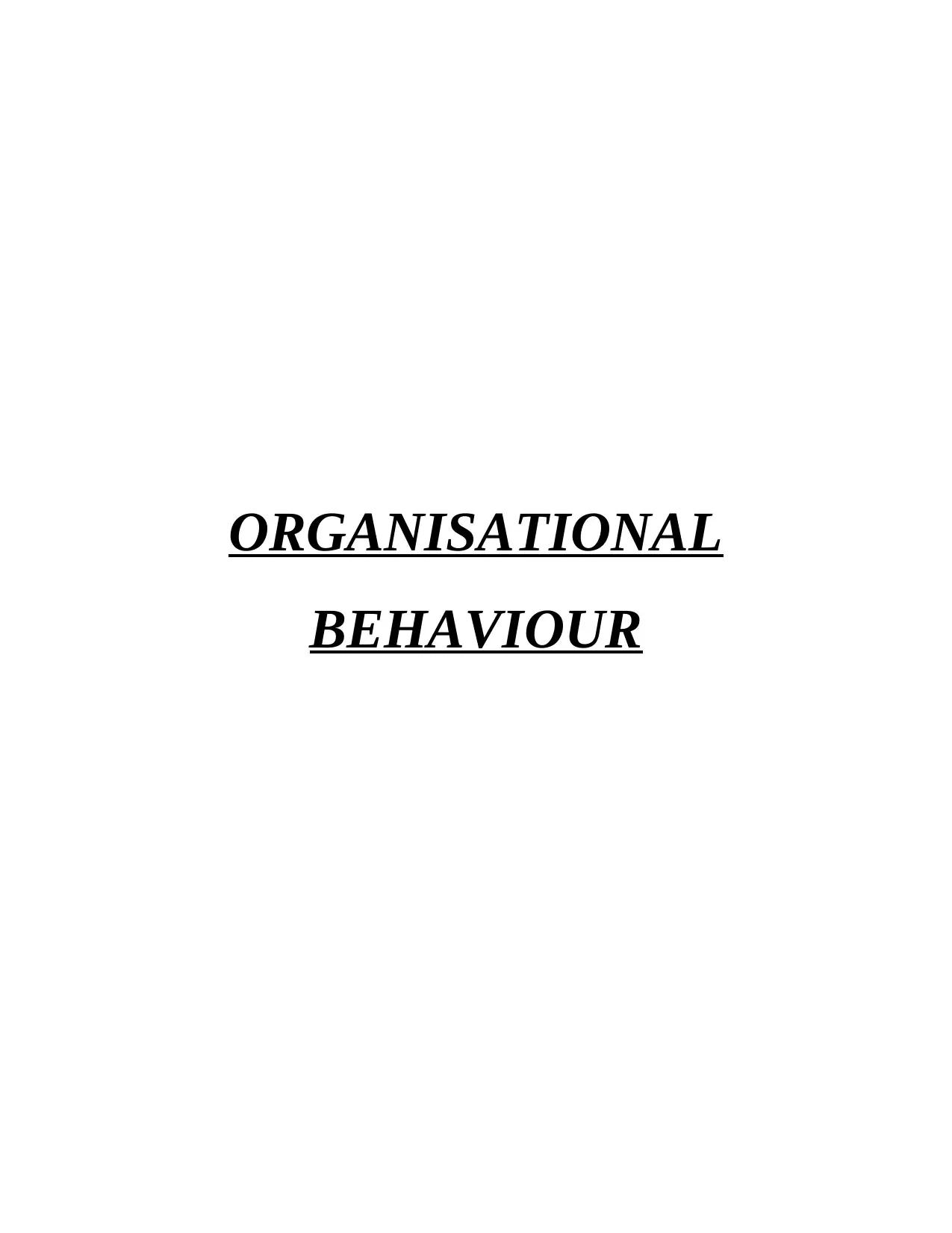
ORGANISATIONAL
BEHAVIOUR
BEHAVIOUR
Paraphrase This Document
Need a fresh take? Get an instant paraphrase of this document with our AI Paraphraser
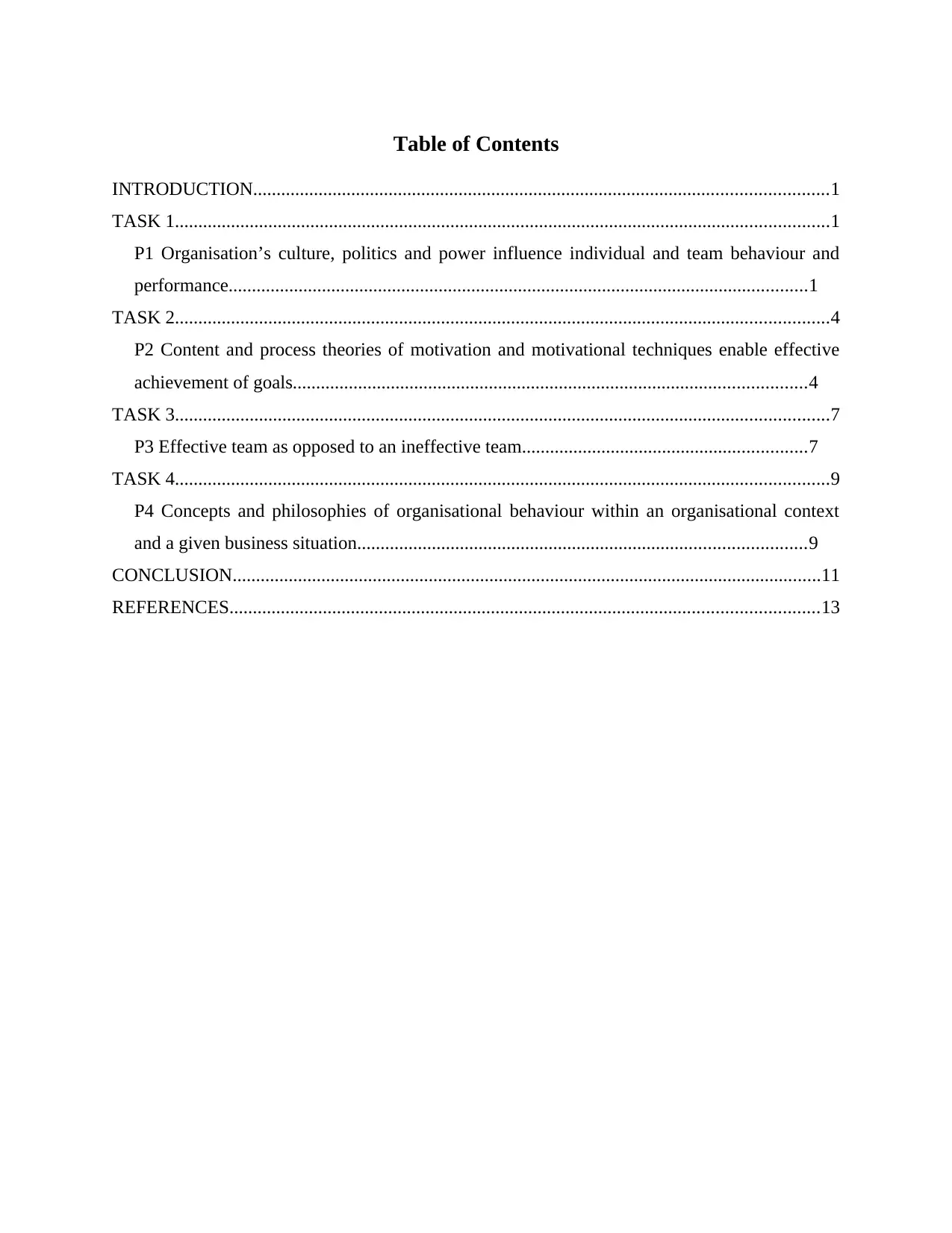
Table of Contents
INTRODUCTION...........................................................................................................................1
TASK 1............................................................................................................................................1
P1 Organisation’s culture, politics and power influence individual and team behaviour and
performance............................................................................................................................1
TASK 2............................................................................................................................................4
P2 Content and process theories of motivation and motivational techniques enable effective
achievement of goals..............................................................................................................4
TASK 3............................................................................................................................................7
P3 Effective team as opposed to an ineffective team.............................................................7
TASK 4............................................................................................................................................9
P4 Concepts and philosophies of organisational behaviour within an organisational context
and a given business situation................................................................................................9
CONCLUSION..............................................................................................................................11
REFERENCES..............................................................................................................................13
INTRODUCTION...........................................................................................................................1
TASK 1............................................................................................................................................1
P1 Organisation’s culture, politics and power influence individual and team behaviour and
performance............................................................................................................................1
TASK 2............................................................................................................................................4
P2 Content and process theories of motivation and motivational techniques enable effective
achievement of goals..............................................................................................................4
TASK 3............................................................................................................................................7
P3 Effective team as opposed to an ineffective team.............................................................7
TASK 4............................................................................................................................................9
P4 Concepts and philosophies of organisational behaviour within an organisational context
and a given business situation................................................................................................9
CONCLUSION..............................................................................................................................11
REFERENCES..............................................................................................................................13

⊘ This is a preview!⊘
Do you want full access?
Subscribe today to unlock all pages.

Trusted by 1+ million students worldwide
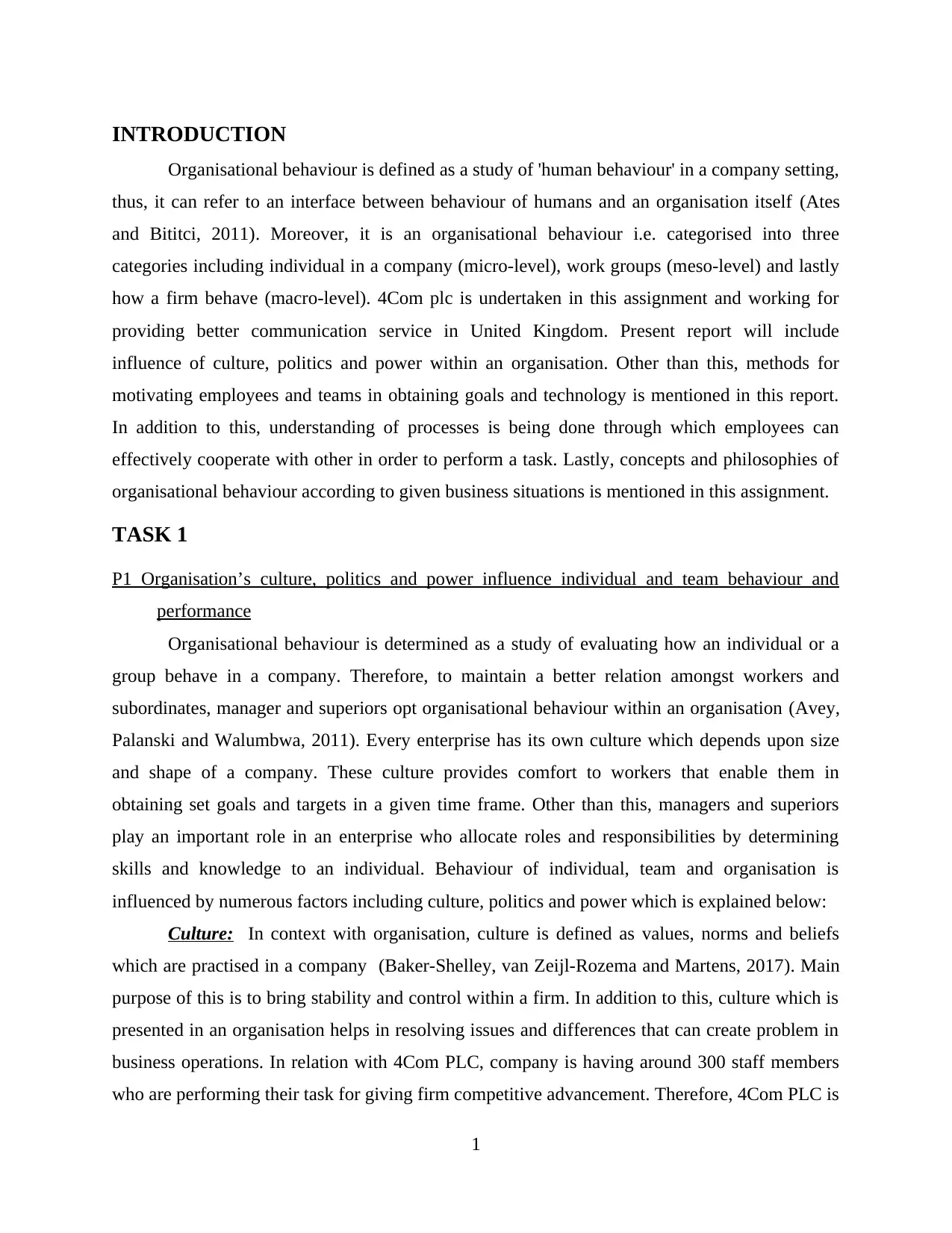
INTRODUCTION
Organisational behaviour is defined as a study of 'human behaviour' in a company setting,
thus, it can refer to an interface between behaviour of humans and an organisation itself (Ates
and Bititci, 2011). Moreover, it is an organisational behaviour i.e. categorised into three
categories including individual in a company (micro-level), work groups (meso-level) and lastly
how a firm behave (macro-level). 4Com plc is undertaken in this assignment and working for
providing better communication service in United Kingdom. Present report will include
influence of culture, politics and power within an organisation. Other than this, methods for
motivating employees and teams in obtaining goals and technology is mentioned in this report.
In addition to this, understanding of processes is being done through which employees can
effectively cooperate with other in order to perform a task. Lastly, concepts and philosophies of
organisational behaviour according to given business situations is mentioned in this assignment.
TASK 1
P1 Organisation’s culture, politics and power influence individual and team behaviour and
performance
Organisational behaviour is determined as a study of evaluating how an individual or a
group behave in a company. Therefore, to maintain a better relation amongst workers and
subordinates, manager and superiors opt organisational behaviour within an organisation (Avey,
Palanski and Walumbwa, 2011). Every enterprise has its own culture which depends upon size
and shape of a company. These culture provides comfort to workers that enable them in
obtaining set goals and targets in a given time frame. Other than this, managers and superiors
play an important role in an enterprise who allocate roles and responsibilities by determining
skills and knowledge to an individual. Behaviour of individual, team and organisation is
influenced by numerous factors including culture, politics and power which is explained below:
Culture: In context with organisation, culture is defined as values, norms and beliefs
which are practised in a company (Baker-Shelley, van Zeijl-Rozema and Martens, 2017). Main
purpose of this is to bring stability and control within a firm. In addition to this, culture which is
presented in an organisation helps in resolving issues and differences that can create problem in
business operations. In relation with 4Com PLC, company is having around 300 staff members
who are performing their task for giving firm competitive advancement. Therefore, 4Com PLC is
1
Organisational behaviour is defined as a study of 'human behaviour' in a company setting,
thus, it can refer to an interface between behaviour of humans and an organisation itself (Ates
and Bititci, 2011). Moreover, it is an organisational behaviour i.e. categorised into three
categories including individual in a company (micro-level), work groups (meso-level) and lastly
how a firm behave (macro-level). 4Com plc is undertaken in this assignment and working for
providing better communication service in United Kingdom. Present report will include
influence of culture, politics and power within an organisation. Other than this, methods for
motivating employees and teams in obtaining goals and technology is mentioned in this report.
In addition to this, understanding of processes is being done through which employees can
effectively cooperate with other in order to perform a task. Lastly, concepts and philosophies of
organisational behaviour according to given business situations is mentioned in this assignment.
TASK 1
P1 Organisation’s culture, politics and power influence individual and team behaviour and
performance
Organisational behaviour is determined as a study of evaluating how an individual or a
group behave in a company. Therefore, to maintain a better relation amongst workers and
subordinates, manager and superiors opt organisational behaviour within an organisation (Avey,
Palanski and Walumbwa, 2011). Every enterprise has its own culture which depends upon size
and shape of a company. These culture provides comfort to workers that enable them in
obtaining set goals and targets in a given time frame. Other than this, managers and superiors
play an important role in an enterprise who allocate roles and responsibilities by determining
skills and knowledge to an individual. Behaviour of individual, team and organisation is
influenced by numerous factors including culture, politics and power which is explained below:
Culture: In context with organisation, culture is defined as values, norms and beliefs
which are practised in a company (Baker-Shelley, van Zeijl-Rozema and Martens, 2017). Main
purpose of this is to bring stability and control within a firm. In addition to this, culture which is
presented in an organisation helps in resolving issues and differences that can create problem in
business operations. In relation with 4Com PLC, company is having around 300 staff members
who are performing their task for giving firm competitive advancement. Therefore, 4Com PLC is
1
Paraphrase This Document
Need a fresh take? Get an instant paraphrase of this document with our AI Paraphraser
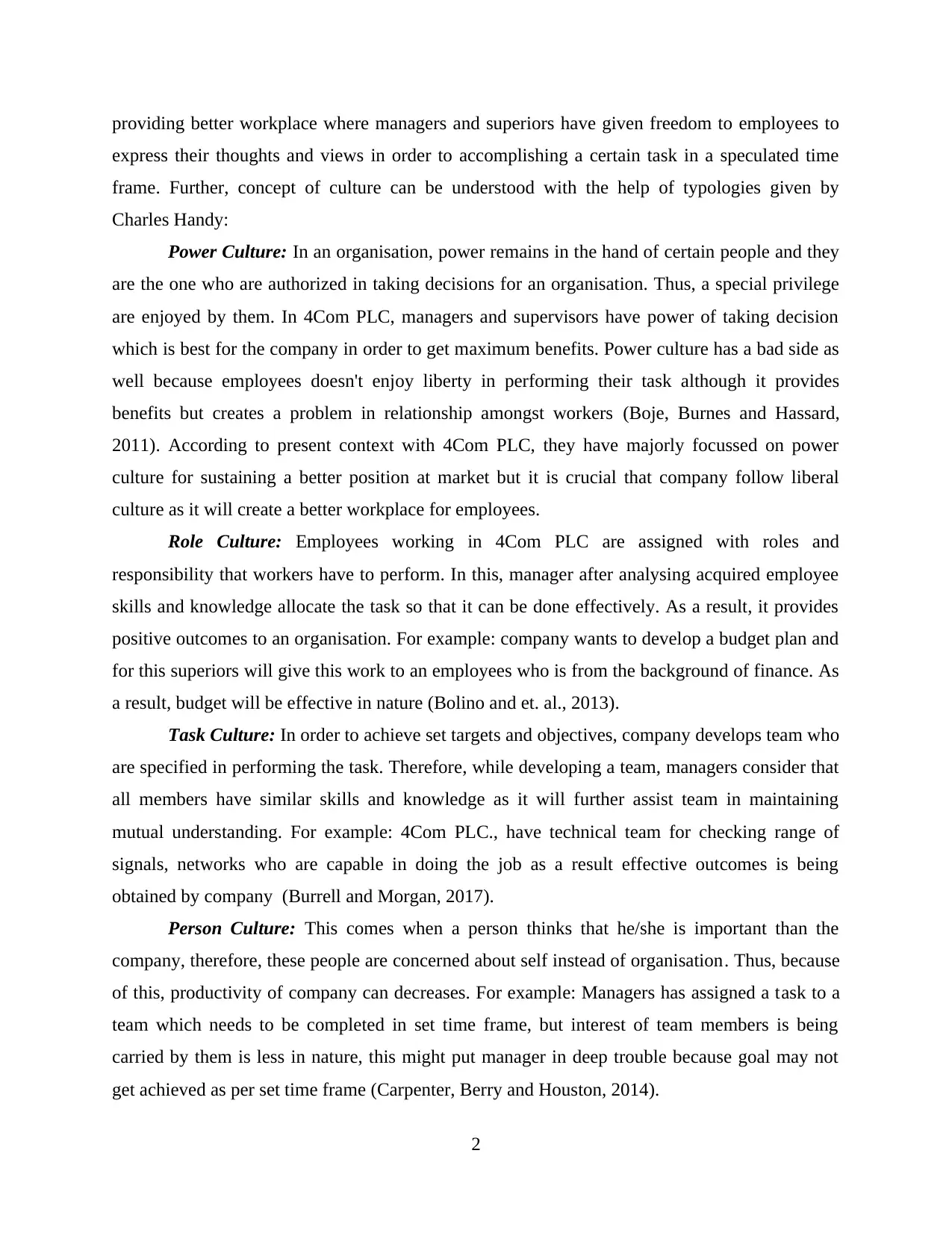
providing better workplace where managers and superiors have given freedom to employees to
express their thoughts and views in order to accomplishing a certain task in a speculated time
frame. Further, concept of culture can be understood with the help of typologies given by
Charles Handy:
Power Culture: In an organisation, power remains in the hand of certain people and they
are the one who are authorized in taking decisions for an organisation. Thus, a special privilege
are enjoyed by them. In 4Com PLC, managers and supervisors have power of taking decision
which is best for the company in order to get maximum benefits. Power culture has a bad side as
well because employees doesn't enjoy liberty in performing their task although it provides
benefits but creates a problem in relationship amongst workers (Boje, Burnes and Hassard,
2011). According to present context with 4Com PLC, they have majorly focussed on power
culture for sustaining a better position at market but it is crucial that company follow liberal
culture as it will create a better workplace for employees.
Role Culture: Employees working in 4Com PLC are assigned with roles and
responsibility that workers have to perform. In this, manager after analysing acquired employee
skills and knowledge allocate the task so that it can be done effectively. As a result, it provides
positive outcomes to an organisation. For example: company wants to develop a budget plan and
for this superiors will give this work to an employees who is from the background of finance. As
a result, budget will be effective in nature (Bolino and et. al., 2013).
Task Culture: In order to achieve set targets and objectives, company develops team who
are specified in performing the task. Therefore, while developing a team, managers consider that
all members have similar skills and knowledge as it will further assist team in maintaining
mutual understanding. For example: 4Com PLC., have technical team for checking range of
signals, networks who are capable in doing the job as a result effective outcomes is being
obtained by company (Burrell and Morgan, 2017).
Person Culture: This comes when a person thinks that he/she is important than the
company, therefore, these people are concerned about self instead of organisation. Thus, because
of this, productivity of company can decreases. For example: Managers has assigned a task to a
team which needs to be completed in set time frame, but interest of team members is being
carried by them is less in nature, this might put manager in deep trouble because goal may not
get achieved as per set time frame (Carpenter, Berry and Houston, 2014).
2
express their thoughts and views in order to accomplishing a certain task in a speculated time
frame. Further, concept of culture can be understood with the help of typologies given by
Charles Handy:
Power Culture: In an organisation, power remains in the hand of certain people and they
are the one who are authorized in taking decisions for an organisation. Thus, a special privilege
are enjoyed by them. In 4Com PLC, managers and supervisors have power of taking decision
which is best for the company in order to get maximum benefits. Power culture has a bad side as
well because employees doesn't enjoy liberty in performing their task although it provides
benefits but creates a problem in relationship amongst workers (Boje, Burnes and Hassard,
2011). According to present context with 4Com PLC, they have majorly focussed on power
culture for sustaining a better position at market but it is crucial that company follow liberal
culture as it will create a better workplace for employees.
Role Culture: Employees working in 4Com PLC are assigned with roles and
responsibility that workers have to perform. In this, manager after analysing acquired employee
skills and knowledge allocate the task so that it can be done effectively. As a result, it provides
positive outcomes to an organisation. For example: company wants to develop a budget plan and
for this superiors will give this work to an employees who is from the background of finance. As
a result, budget will be effective in nature (Bolino and et. al., 2013).
Task Culture: In order to achieve set targets and objectives, company develops team who
are specified in performing the task. Therefore, while developing a team, managers consider that
all members have similar skills and knowledge as it will further assist team in maintaining
mutual understanding. For example: 4Com PLC., have technical team for checking range of
signals, networks who are capable in doing the job as a result effective outcomes is being
obtained by company (Burrell and Morgan, 2017).
Person Culture: This comes when a person thinks that he/she is important than the
company, therefore, these people are concerned about self instead of organisation. Thus, because
of this, productivity of company can decreases. For example: Managers has assigned a task to a
team which needs to be completed in set time frame, but interest of team members is being
carried by them is less in nature, this might put manager in deep trouble because goal may not
get achieved as per set time frame (Carpenter, Berry and Houston, 2014).
2
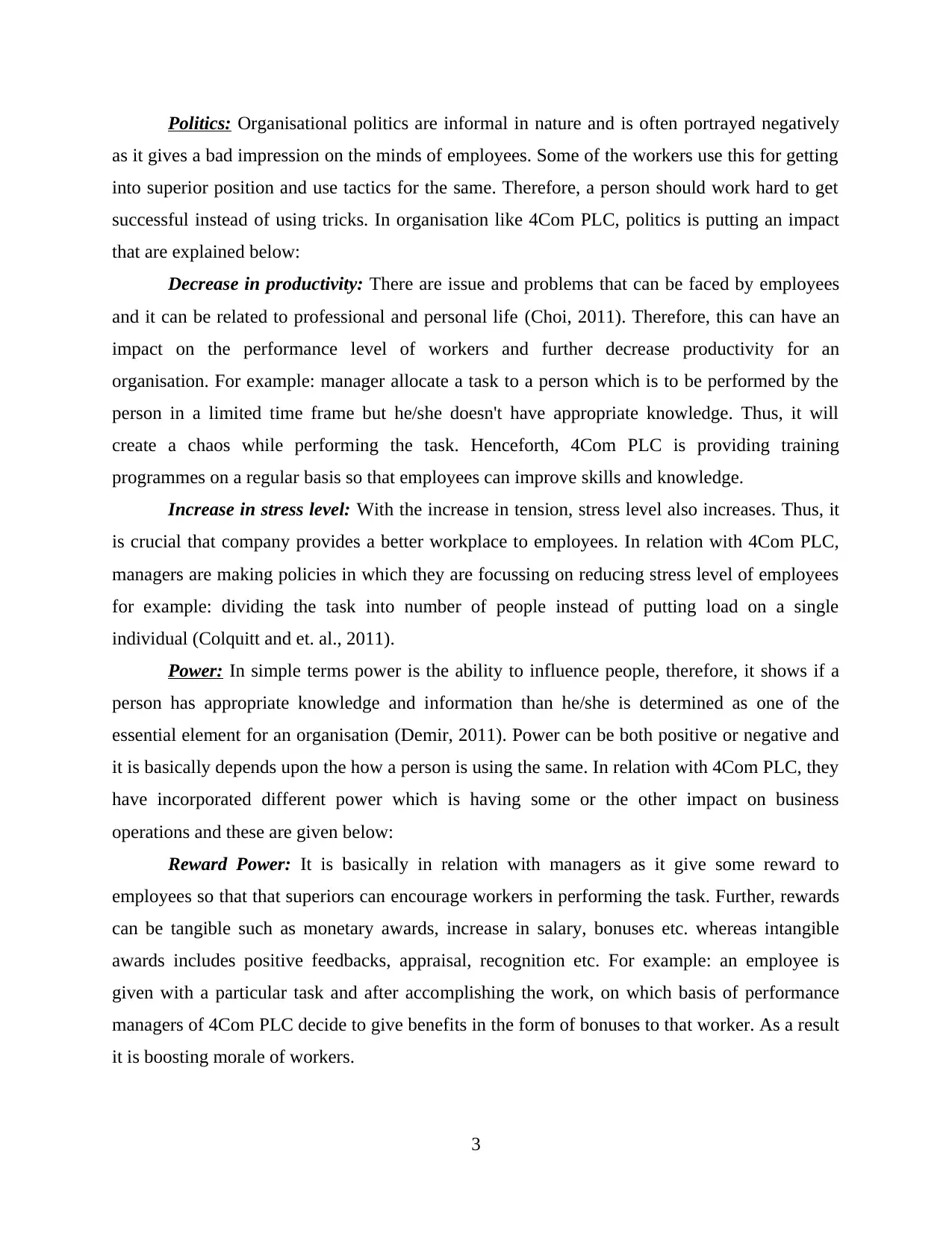
Politics: Organisational politics are informal in nature and is often portrayed negatively
as it gives a bad impression on the minds of employees. Some of the workers use this for getting
into superior position and use tactics for the same. Therefore, a person should work hard to get
successful instead of using tricks. In organisation like 4Com PLC, politics is putting an impact
that are explained below:
Decrease in productivity: There are issue and problems that can be faced by employees
and it can be related to professional and personal life (Choi, 2011). Therefore, this can have an
impact on the performance level of workers and further decrease productivity for an
organisation. For example: manager allocate a task to a person which is to be performed by the
person in a limited time frame but he/she doesn't have appropriate knowledge. Thus, it will
create a chaos while performing the task. Henceforth, 4Com PLC is providing training
programmes on a regular basis so that employees can improve skills and knowledge.
Increase in stress level: With the increase in tension, stress level also increases. Thus, it
is crucial that company provides a better workplace to employees. In relation with 4Com PLC,
managers are making policies in which they are focussing on reducing stress level of employees
for example: dividing the task into number of people instead of putting load on a single
individual (Colquitt and et. al., 2011).
Power: In simple terms power is the ability to influence people, therefore, it shows if a
person has appropriate knowledge and information than he/she is determined as one of the
essential element for an organisation (Demir, 2011). Power can be both positive or negative and
it is basically depends upon the how a person is using the same. In relation with 4Com PLC, they
have incorporated different power which is having some or the other impact on business
operations and these are given below:
Reward Power: It is basically in relation with managers as it give some reward to
employees so that that superiors can encourage workers in performing the task. Further, rewards
can be tangible such as monetary awards, increase in salary, bonuses etc. whereas intangible
awards includes positive feedbacks, appraisal, recognition etc. For example: an employee is
given with a particular task and after accomplishing the work, on which basis of performance
managers of 4Com PLC decide to give benefits in the form of bonuses to that worker. As a result
it is boosting morale of workers.
3
as it gives a bad impression on the minds of employees. Some of the workers use this for getting
into superior position and use tactics for the same. Therefore, a person should work hard to get
successful instead of using tricks. In organisation like 4Com PLC, politics is putting an impact
that are explained below:
Decrease in productivity: There are issue and problems that can be faced by employees
and it can be related to professional and personal life (Choi, 2011). Therefore, this can have an
impact on the performance level of workers and further decrease productivity for an
organisation. For example: manager allocate a task to a person which is to be performed by the
person in a limited time frame but he/she doesn't have appropriate knowledge. Thus, it will
create a chaos while performing the task. Henceforth, 4Com PLC is providing training
programmes on a regular basis so that employees can improve skills and knowledge.
Increase in stress level: With the increase in tension, stress level also increases. Thus, it
is crucial that company provides a better workplace to employees. In relation with 4Com PLC,
managers are making policies in which they are focussing on reducing stress level of employees
for example: dividing the task into number of people instead of putting load on a single
individual (Colquitt and et. al., 2011).
Power: In simple terms power is the ability to influence people, therefore, it shows if a
person has appropriate knowledge and information than he/she is determined as one of the
essential element for an organisation (Demir, 2011). Power can be both positive or negative and
it is basically depends upon the how a person is using the same. In relation with 4Com PLC, they
have incorporated different power which is having some or the other impact on business
operations and these are given below:
Reward Power: It is basically in relation with managers as it give some reward to
employees so that that superiors can encourage workers in performing the task. Further, rewards
can be tangible such as monetary awards, increase in salary, bonuses etc. whereas intangible
awards includes positive feedbacks, appraisal, recognition etc. For example: an employee is
given with a particular task and after accomplishing the work, on which basis of performance
managers of 4Com PLC decide to give benefits in the form of bonuses to that worker. As a result
it is boosting morale of workers.
3
⊘ This is a preview!⊘
Do you want full access?
Subscribe today to unlock all pages.

Trusted by 1+ million students worldwide
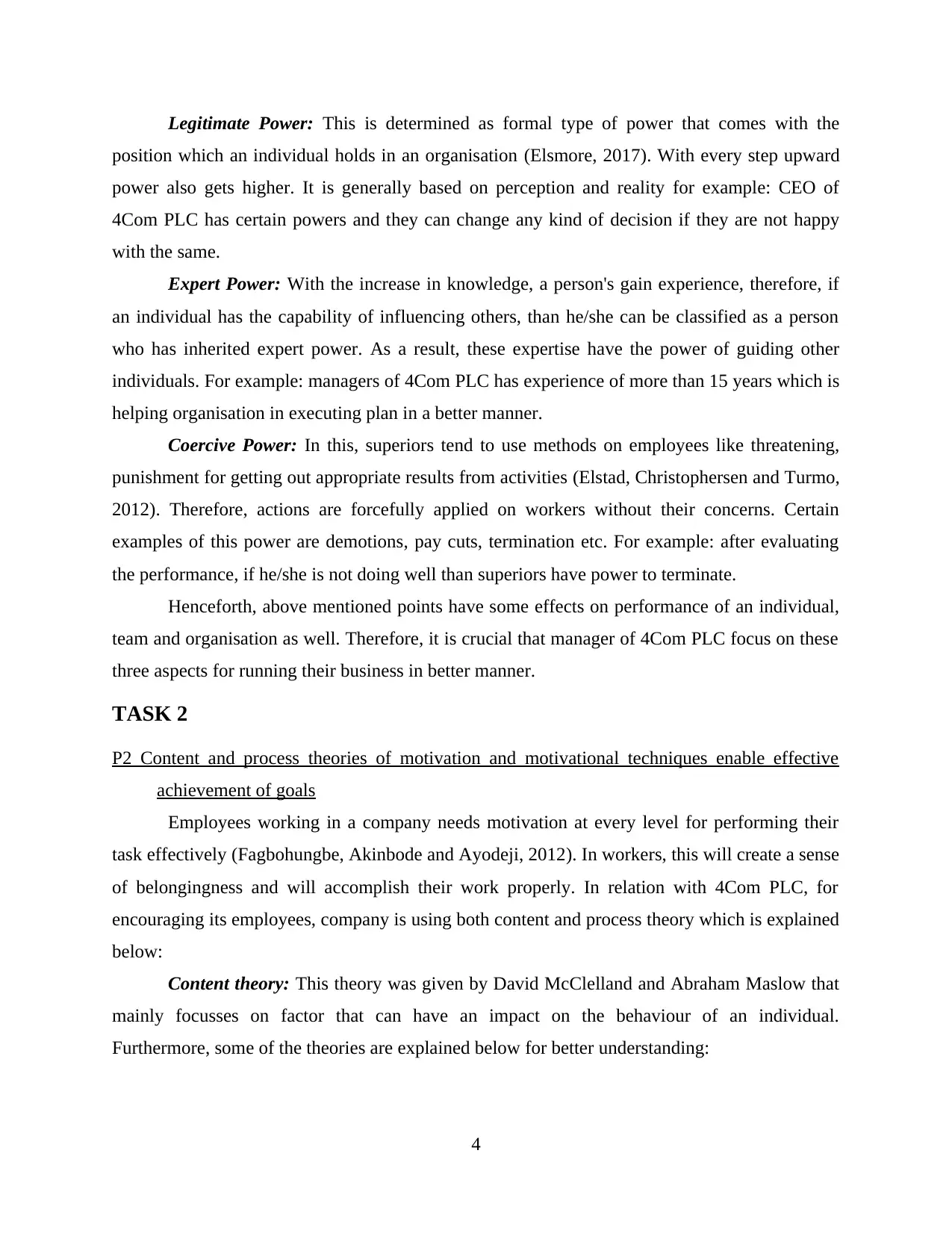
Legitimate Power: This is determined as formal type of power that comes with the
position which an individual holds in an organisation (Elsmore, 2017). With every step upward
power also gets higher. It is generally based on perception and reality for example: CEO of
4Com PLC has certain powers and they can change any kind of decision if they are not happy
with the same.
Expert Power: With the increase in knowledge, a person's gain experience, therefore, if
an individual has the capability of influencing others, than he/she can be classified as a person
who has inherited expert power. As a result, these expertise have the power of guiding other
individuals. For example: managers of 4Com PLC has experience of more than 15 years which is
helping organisation in executing plan in a better manner.
Coercive Power: In this, superiors tend to use methods on employees like threatening,
punishment for getting out appropriate results from activities (Elstad, Christophersen and Turmo,
2012). Therefore, actions are forcefully applied on workers without their concerns. Certain
examples of this power are demotions, pay cuts, termination etc. For example: after evaluating
the performance, if he/she is not doing well than superiors have power to terminate.
Henceforth, above mentioned points have some effects on performance of an individual,
team and organisation as well. Therefore, it is crucial that manager of 4Com PLC focus on these
three aspects for running their business in better manner.
TASK 2
P2 Content and process theories of motivation and motivational techniques enable effective
achievement of goals
Employees working in a company needs motivation at every level for performing their
task effectively (Fagbohungbe, Akinbode and Ayodeji, 2012). In workers, this will create a sense
of belongingness and will accomplish their work properly. In relation with 4Com PLC, for
encouraging its employees, company is using both content and process theory which is explained
below:
Content theory: This theory was given by David McClelland and Abraham Maslow that
mainly focusses on factor that can have an impact on the behaviour of an individual.
Furthermore, some of the theories are explained below for better understanding:
4
position which an individual holds in an organisation (Elsmore, 2017). With every step upward
power also gets higher. It is generally based on perception and reality for example: CEO of
4Com PLC has certain powers and they can change any kind of decision if they are not happy
with the same.
Expert Power: With the increase in knowledge, a person's gain experience, therefore, if
an individual has the capability of influencing others, than he/she can be classified as a person
who has inherited expert power. As a result, these expertise have the power of guiding other
individuals. For example: managers of 4Com PLC has experience of more than 15 years which is
helping organisation in executing plan in a better manner.
Coercive Power: In this, superiors tend to use methods on employees like threatening,
punishment for getting out appropriate results from activities (Elstad, Christophersen and Turmo,
2012). Therefore, actions are forcefully applied on workers without their concerns. Certain
examples of this power are demotions, pay cuts, termination etc. For example: after evaluating
the performance, if he/she is not doing well than superiors have power to terminate.
Henceforth, above mentioned points have some effects on performance of an individual,
team and organisation as well. Therefore, it is crucial that manager of 4Com PLC focus on these
three aspects for running their business in better manner.
TASK 2
P2 Content and process theories of motivation and motivational techniques enable effective
achievement of goals
Employees working in a company needs motivation at every level for performing their
task effectively (Fagbohungbe, Akinbode and Ayodeji, 2012). In workers, this will create a sense
of belongingness and will accomplish their work properly. In relation with 4Com PLC, for
encouraging its employees, company is using both content and process theory which is explained
below:
Content theory: This theory was given by David McClelland and Abraham Maslow that
mainly focusses on factor that can have an impact on the behaviour of an individual.
Furthermore, some of the theories are explained below for better understanding:
4
Paraphrase This Document
Need a fresh take? Get an instant paraphrase of this document with our AI Paraphraser
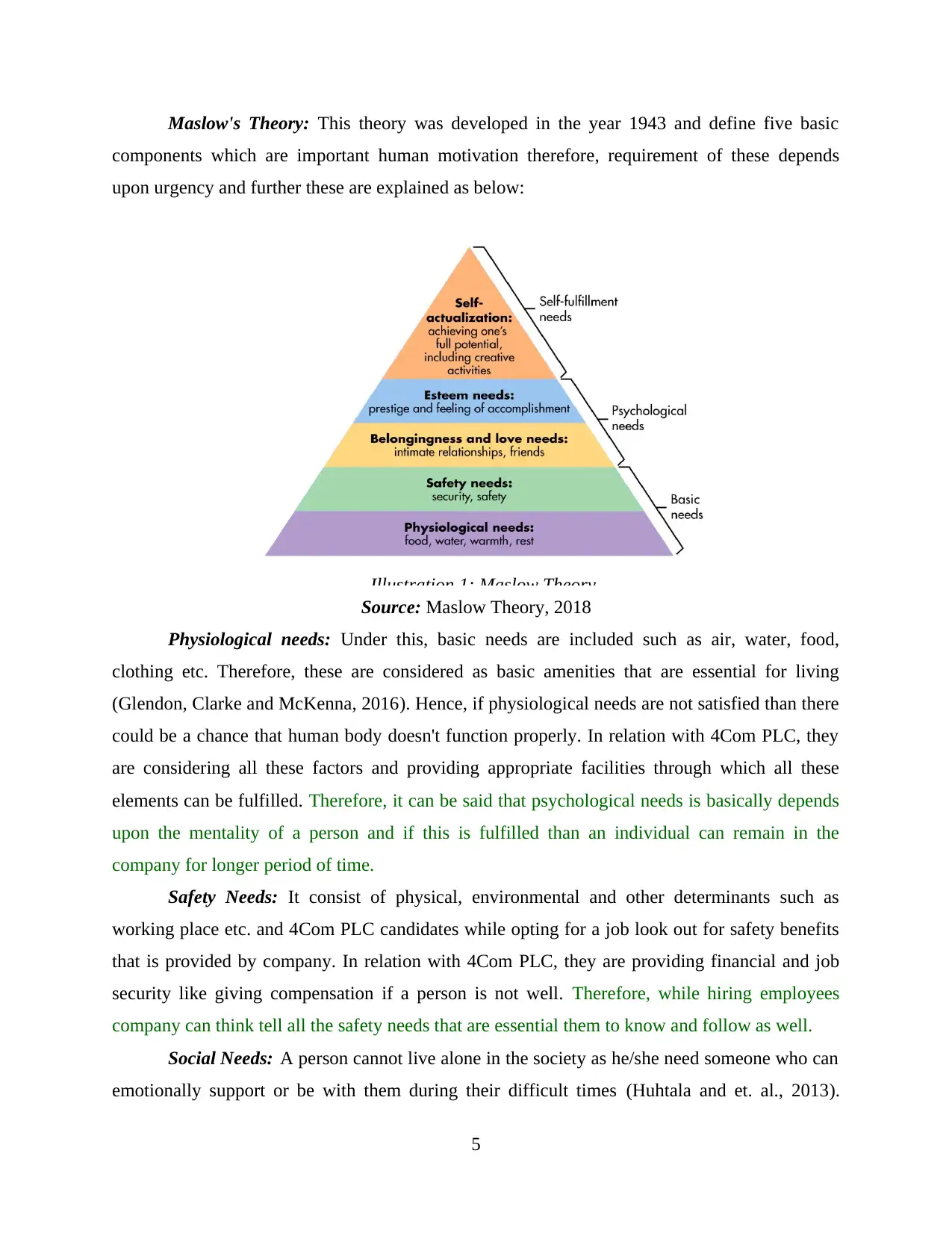
Maslow's Theory: This theory was developed in the year 1943 and define five basic
components which are important human motivation therefore, requirement of these depends
upon urgency and further these are explained as below:
Source: Maslow Theory, 2018
Physiological needs: Under this, basic needs are included such as air, water, food,
clothing etc. Therefore, these are considered as basic amenities that are essential for living
(Glendon, Clarke and McKenna, 2016). Hence, if physiological needs are not satisfied than there
could be a chance that human body doesn't function properly. In relation with 4Com PLC, they
are considering all these factors and providing appropriate facilities through which all these
elements can be fulfilled. Therefore, it can be said that psychological needs is basically depends
upon the mentality of a person and if this is fulfilled than an individual can remain in the
company for longer period of time.
Safety Needs: It consist of physical, environmental and other determinants such as
working place etc. and 4Com PLC candidates while opting for a job look out for safety benefits
that is provided by company. In relation with 4Com PLC, they are providing financial and job
security like giving compensation if a person is not well. Therefore, while hiring employees
company can think tell all the safety needs that are essential them to know and follow as well.
Social Needs: A person cannot live alone in the society as he/she need someone who can
emotionally support or be with them during their difficult times (Huhtala and et. al., 2013).
5
Illustration 1: Maslow Theory
components which are important human motivation therefore, requirement of these depends
upon urgency and further these are explained as below:
Source: Maslow Theory, 2018
Physiological needs: Under this, basic needs are included such as air, water, food,
clothing etc. Therefore, these are considered as basic amenities that are essential for living
(Glendon, Clarke and McKenna, 2016). Hence, if physiological needs are not satisfied than there
could be a chance that human body doesn't function properly. In relation with 4Com PLC, they
are considering all these factors and providing appropriate facilities through which all these
elements can be fulfilled. Therefore, it can be said that psychological needs is basically depends
upon the mentality of a person and if this is fulfilled than an individual can remain in the
company for longer period of time.
Safety Needs: It consist of physical, environmental and other determinants such as
working place etc. and 4Com PLC candidates while opting for a job look out for safety benefits
that is provided by company. In relation with 4Com PLC, they are providing financial and job
security like giving compensation if a person is not well. Therefore, while hiring employees
company can think tell all the safety needs that are essential them to know and follow as well.
Social Needs: A person cannot live alone in the society as he/she need someone who can
emotionally support or be with them during their difficult times (Huhtala and et. al., 2013).
5
Illustration 1: Maslow Theory
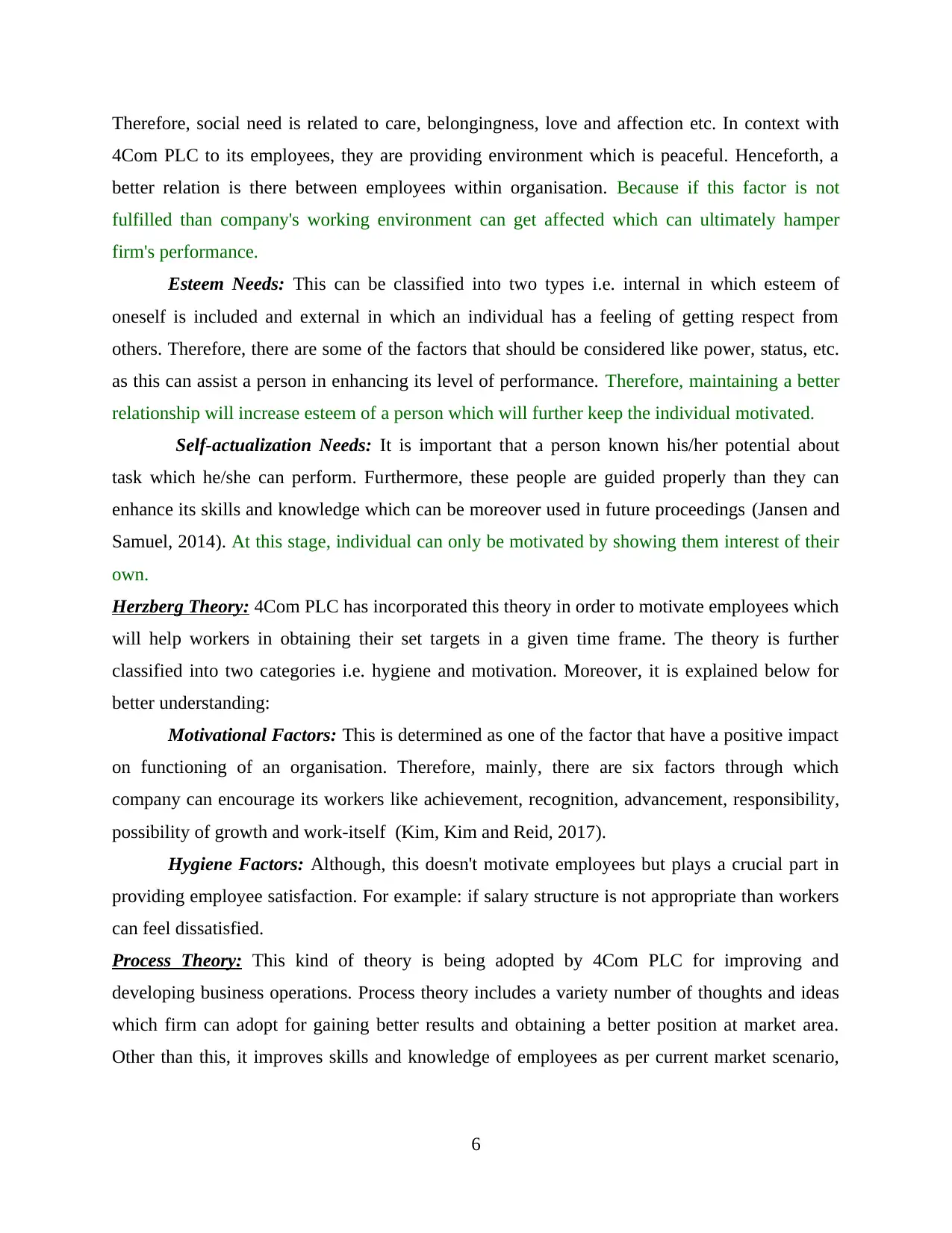
Therefore, social need is related to care, belongingness, love and affection etc. In context with
4Com PLC to its employees, they are providing environment which is peaceful. Henceforth, a
better relation is there between employees within organisation. Because if this factor is not
fulfilled than company's working environment can get affected which can ultimately hamper
firm's performance.
Esteem Needs: This can be classified into two types i.e. internal in which esteem of
oneself is included and external in which an individual has a feeling of getting respect from
others. Therefore, there are some of the factors that should be considered like power, status, etc.
as this can assist a person in enhancing its level of performance. Therefore, maintaining a better
relationship will increase esteem of a person which will further keep the individual motivated.
Self-actualization Needs: It is important that a person known his/her potential about
task which he/she can perform. Furthermore, these people are guided properly than they can
enhance its skills and knowledge which can be moreover used in future proceedings (Jansen and
Samuel, 2014). At this stage, individual can only be motivated by showing them interest of their
own.
Herzberg Theory: 4Com PLC has incorporated this theory in order to motivate employees which
will help workers in obtaining their set targets in a given time frame. The theory is further
classified into two categories i.e. hygiene and motivation. Moreover, it is explained below for
better understanding:
Motivational Factors: This is determined as one of the factor that have a positive impact
on functioning of an organisation. Therefore, mainly, there are six factors through which
company can encourage its workers like achievement, recognition, advancement, responsibility,
possibility of growth and work-itself (Kim, Kim and Reid, 2017).
Hygiene Factors: Although, this doesn't motivate employees but plays a crucial part in
providing employee satisfaction. For example: if salary structure is not appropriate than workers
can feel dissatisfied.
Process Theory: This kind of theory is being adopted by 4Com PLC for improving and
developing business operations. Process theory includes a variety number of thoughts and ideas
which firm can adopt for gaining better results and obtaining a better position at market area.
Other than this, it improves skills and knowledge of employees as per current market scenario,
6
4Com PLC to its employees, they are providing environment which is peaceful. Henceforth, a
better relation is there between employees within organisation. Because if this factor is not
fulfilled than company's working environment can get affected which can ultimately hamper
firm's performance.
Esteem Needs: This can be classified into two types i.e. internal in which esteem of
oneself is included and external in which an individual has a feeling of getting respect from
others. Therefore, there are some of the factors that should be considered like power, status, etc.
as this can assist a person in enhancing its level of performance. Therefore, maintaining a better
relationship will increase esteem of a person which will further keep the individual motivated.
Self-actualization Needs: It is important that a person known his/her potential about
task which he/she can perform. Furthermore, these people are guided properly than they can
enhance its skills and knowledge which can be moreover used in future proceedings (Jansen and
Samuel, 2014). At this stage, individual can only be motivated by showing them interest of their
own.
Herzberg Theory: 4Com PLC has incorporated this theory in order to motivate employees which
will help workers in obtaining their set targets in a given time frame. The theory is further
classified into two categories i.e. hygiene and motivation. Moreover, it is explained below for
better understanding:
Motivational Factors: This is determined as one of the factor that have a positive impact
on functioning of an organisation. Therefore, mainly, there are six factors through which
company can encourage its workers like achievement, recognition, advancement, responsibility,
possibility of growth and work-itself (Kim, Kim and Reid, 2017).
Hygiene Factors: Although, this doesn't motivate employees but plays a crucial part in
providing employee satisfaction. For example: if salary structure is not appropriate than workers
can feel dissatisfied.
Process Theory: This kind of theory is being adopted by 4Com PLC for improving and
developing business operations. Process theory includes a variety number of thoughts and ideas
which firm can adopt for gaining better results and obtaining a better position at market area.
Other than this, it improves skills and knowledge of employees as per current market scenario,
6
⊘ This is a preview!⊘
Do you want full access?
Subscribe today to unlock all pages.

Trusted by 1+ million students worldwide
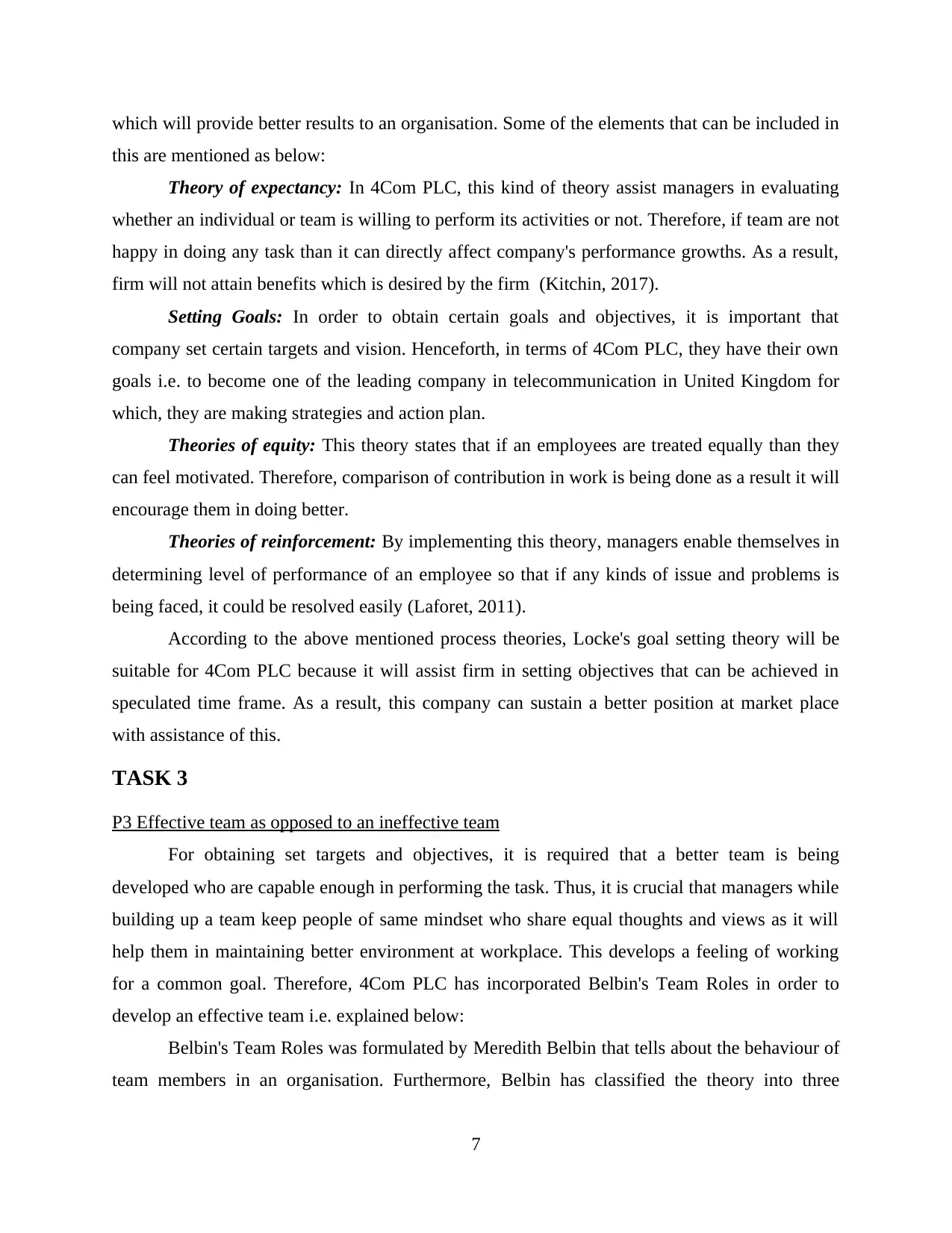
which will provide better results to an organisation. Some of the elements that can be included in
this are mentioned as below:
Theory of expectancy: In 4Com PLC, this kind of theory assist managers in evaluating
whether an individual or team is willing to perform its activities or not. Therefore, if team are not
happy in doing any task than it can directly affect company's performance growths. As a result,
firm will not attain benefits which is desired by the firm (Kitchin, 2017).
Setting Goals: In order to obtain certain goals and objectives, it is important that
company set certain targets and vision. Henceforth, in terms of 4Com PLC, they have their own
goals i.e. to become one of the leading company in telecommunication in United Kingdom for
which, they are making strategies and action plan.
Theories of equity: This theory states that if an employees are treated equally than they
can feel motivated. Therefore, comparison of contribution in work is being done as a result it will
encourage them in doing better.
Theories of reinforcement: By implementing this theory, managers enable themselves in
determining level of performance of an employee so that if any kinds of issue and problems is
being faced, it could be resolved easily (Laforet, 2011).
According to the above mentioned process theories, Locke's goal setting theory will be
suitable for 4Com PLC because it will assist firm in setting objectives that can be achieved in
speculated time frame. As a result, this company can sustain a better position at market place
with assistance of this.
TASK 3
P3 Effective team as opposed to an ineffective team
For obtaining set targets and objectives, it is required that a better team is being
developed who are capable enough in performing the task. Thus, it is crucial that managers while
building up a team keep people of same mindset who share equal thoughts and views as it will
help them in maintaining better environment at workplace. This develops a feeling of working
for a common goal. Therefore, 4Com PLC has incorporated Belbin's Team Roles in order to
develop an effective team i.e. explained below:
Belbin's Team Roles was formulated by Meredith Belbin that tells about the behaviour of
team members in an organisation. Furthermore, Belbin has classified the theory into three
7
this are mentioned as below:
Theory of expectancy: In 4Com PLC, this kind of theory assist managers in evaluating
whether an individual or team is willing to perform its activities or not. Therefore, if team are not
happy in doing any task than it can directly affect company's performance growths. As a result,
firm will not attain benefits which is desired by the firm (Kitchin, 2017).
Setting Goals: In order to obtain certain goals and objectives, it is important that
company set certain targets and vision. Henceforth, in terms of 4Com PLC, they have their own
goals i.e. to become one of the leading company in telecommunication in United Kingdom for
which, they are making strategies and action plan.
Theories of equity: This theory states that if an employees are treated equally than they
can feel motivated. Therefore, comparison of contribution in work is being done as a result it will
encourage them in doing better.
Theories of reinforcement: By implementing this theory, managers enable themselves in
determining level of performance of an employee so that if any kinds of issue and problems is
being faced, it could be resolved easily (Laforet, 2011).
According to the above mentioned process theories, Locke's goal setting theory will be
suitable for 4Com PLC because it will assist firm in setting objectives that can be achieved in
speculated time frame. As a result, this company can sustain a better position at market place
with assistance of this.
TASK 3
P3 Effective team as opposed to an ineffective team
For obtaining set targets and objectives, it is required that a better team is being
developed who are capable enough in performing the task. Thus, it is crucial that managers while
building up a team keep people of same mindset who share equal thoughts and views as it will
help them in maintaining better environment at workplace. This develops a feeling of working
for a common goal. Therefore, 4Com PLC has incorporated Belbin's Team Roles in order to
develop an effective team i.e. explained below:
Belbin's Team Roles was formulated by Meredith Belbin that tells about the behaviour of
team members in an organisation. Furthermore, Belbin has classified the theory into three
7
Paraphrase This Document
Need a fresh take? Get an instant paraphrase of this document with our AI Paraphraser
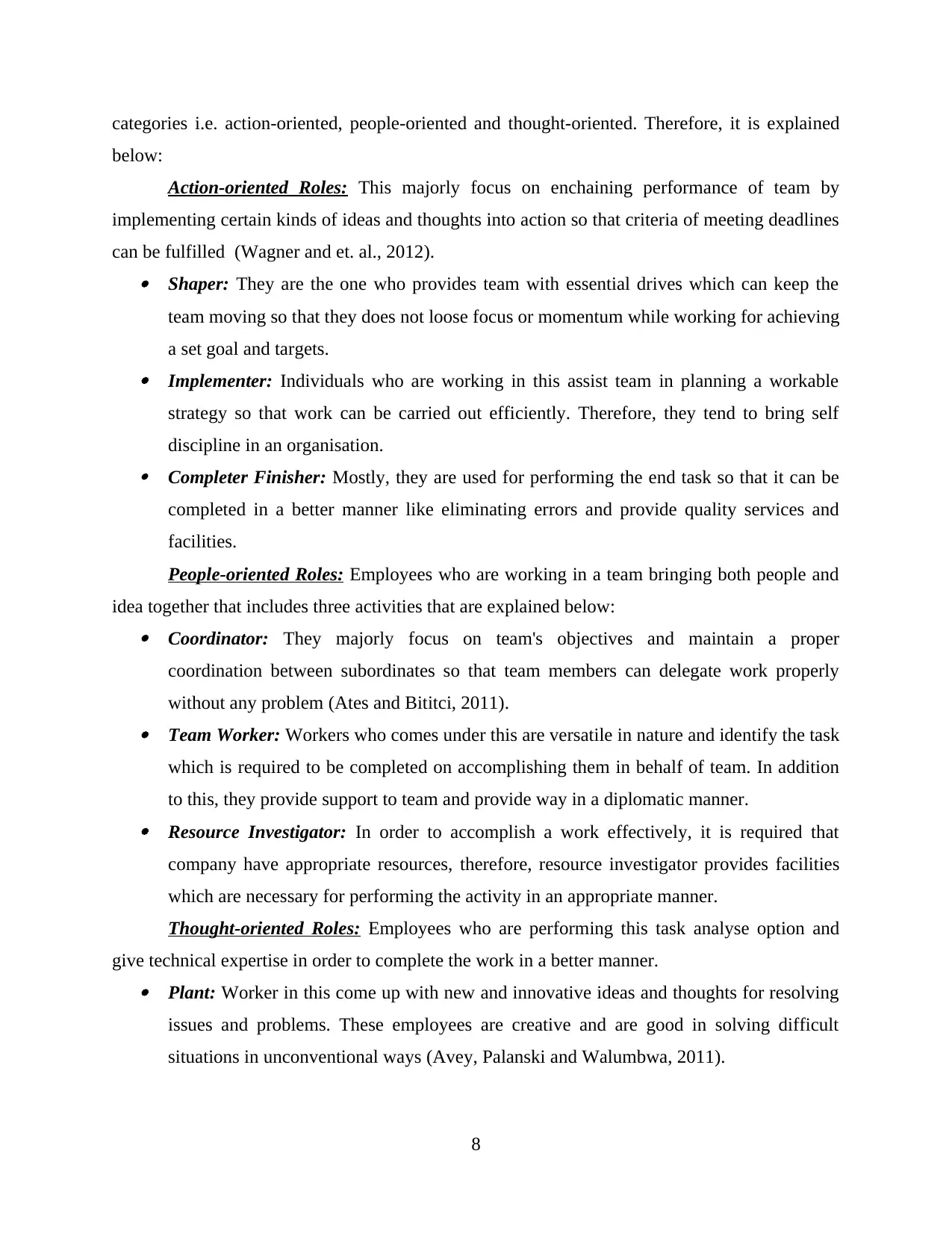
categories i.e. action-oriented, people-oriented and thought-oriented. Therefore, it is explained
below:
Action-oriented Roles: This majorly focus on enchaining performance of team by
implementing certain kinds of ideas and thoughts into action so that criteria of meeting deadlines
can be fulfilled (Wagner and et. al., 2012). Shaper: They are the one who provides team with essential drives which can keep the
team moving so that they does not loose focus or momentum while working for achieving
a set goal and targets. Implementer: Individuals who are working in this assist team in planning a workable
strategy so that work can be carried out efficiently. Therefore, they tend to bring self
discipline in an organisation. Completer Finisher: Mostly, they are used for performing the end task so that it can be
completed in a better manner like eliminating errors and provide quality services and
facilities.
People-oriented Roles: Employees who are working in a team bringing both people and
idea together that includes three activities that are explained below: Coordinator: They majorly focus on team's objectives and maintain a proper
coordination between subordinates so that team members can delegate work properly
without any problem (Ates and Bititci, 2011). Team Worker: Workers who comes under this are versatile in nature and identify the task
which is required to be completed on accomplishing them in behalf of team. In addition
to this, they provide support to team and provide way in a diplomatic manner. Resource Investigator: In order to accomplish a work effectively, it is required that
company have appropriate resources, therefore, resource investigator provides facilities
which are necessary for performing the activity in an appropriate manner.
Thought-oriented Roles: Employees who are performing this task analyse option and
give technical expertise in order to complete the work in a better manner. Plant: Worker in this come up with new and innovative ideas and thoughts for resolving
issues and problems. These employees are creative and are good in solving difficult
situations in unconventional ways (Avey, Palanski and Walumbwa, 2011).
8
below:
Action-oriented Roles: This majorly focus on enchaining performance of team by
implementing certain kinds of ideas and thoughts into action so that criteria of meeting deadlines
can be fulfilled (Wagner and et. al., 2012). Shaper: They are the one who provides team with essential drives which can keep the
team moving so that they does not loose focus or momentum while working for achieving
a set goal and targets. Implementer: Individuals who are working in this assist team in planning a workable
strategy so that work can be carried out efficiently. Therefore, they tend to bring self
discipline in an organisation. Completer Finisher: Mostly, they are used for performing the end task so that it can be
completed in a better manner like eliminating errors and provide quality services and
facilities.
People-oriented Roles: Employees who are working in a team bringing both people and
idea together that includes three activities that are explained below: Coordinator: They majorly focus on team's objectives and maintain a proper
coordination between subordinates so that team members can delegate work properly
without any problem (Ates and Bititci, 2011). Team Worker: Workers who comes under this are versatile in nature and identify the task
which is required to be completed on accomplishing them in behalf of team. In addition
to this, they provide support to team and provide way in a diplomatic manner. Resource Investigator: In order to accomplish a work effectively, it is required that
company have appropriate resources, therefore, resource investigator provides facilities
which are necessary for performing the activity in an appropriate manner.
Thought-oriented Roles: Employees who are performing this task analyse option and
give technical expertise in order to complete the work in a better manner. Plant: Worker in this come up with new and innovative ideas and thoughts for resolving
issues and problems. These employees are creative and are good in solving difficult
situations in unconventional ways (Avey, Palanski and Walumbwa, 2011).
8
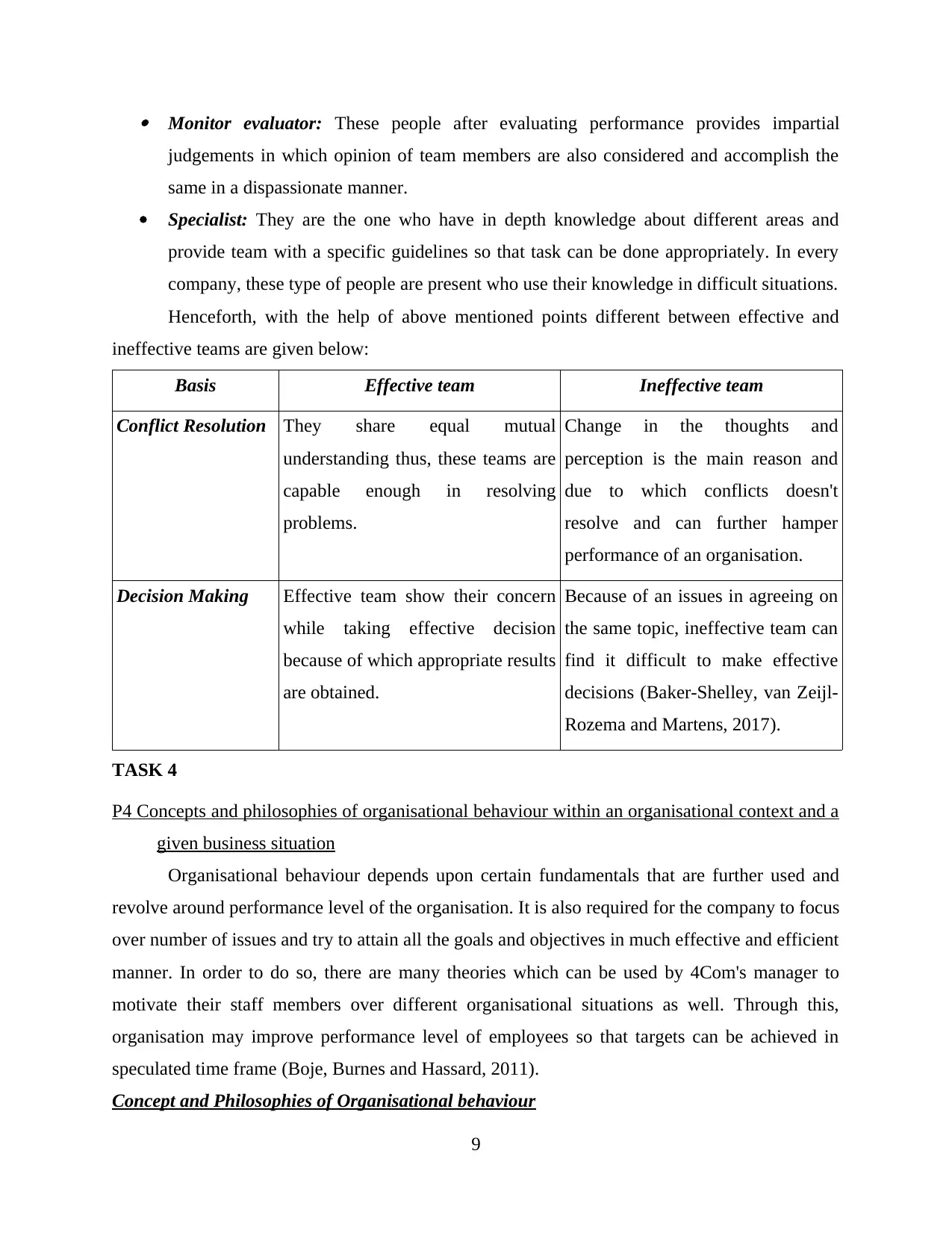
Monitor evaluator: These people after evaluating performance provides impartial
judgements in which opinion of team members are also considered and accomplish the
same in a dispassionate manner.
Specialist: They are the one who have in depth knowledge about different areas and
provide team with a specific guidelines so that task can be done appropriately. In every
company, these type of people are present who use their knowledge in difficult situations.
Henceforth, with the help of above mentioned points different between effective and
ineffective teams are given below:
Basis Effective team Ineffective team
Conflict Resolution They share equal mutual
understanding thus, these teams are
capable enough in resolving
problems.
Change in the thoughts and
perception is the main reason and
due to which conflicts doesn't
resolve and can further hamper
performance of an organisation.
Decision Making Effective team show their concern
while taking effective decision
because of which appropriate results
are obtained.
Because of an issues in agreeing on
the same topic, ineffective team can
find it difficult to make effective
decisions (Baker-Shelley, van Zeijl-
Rozema and Martens, 2017).
TASK 4
P4 Concepts and philosophies of organisational behaviour within an organisational context and a
given business situation
Organisational behaviour depends upon certain fundamentals that are further used and
revolve around performance level of the organisation. It is also required for the company to focus
over number of issues and try to attain all the goals and objectives in much effective and efficient
manner. In order to do so, there are many theories which can be used by 4Com's manager to
motivate their staff members over different organisational situations as well. Through this,
organisation may improve performance level of employees so that targets can be achieved in
speculated time frame (Boje, Burnes and Hassard, 2011).
Concept and Philosophies of Organisational behaviour
9
judgements in which opinion of team members are also considered and accomplish the
same in a dispassionate manner.
Specialist: They are the one who have in depth knowledge about different areas and
provide team with a specific guidelines so that task can be done appropriately. In every
company, these type of people are present who use their knowledge in difficult situations.
Henceforth, with the help of above mentioned points different between effective and
ineffective teams are given below:
Basis Effective team Ineffective team
Conflict Resolution They share equal mutual
understanding thus, these teams are
capable enough in resolving
problems.
Change in the thoughts and
perception is the main reason and
due to which conflicts doesn't
resolve and can further hamper
performance of an organisation.
Decision Making Effective team show their concern
while taking effective decision
because of which appropriate results
are obtained.
Because of an issues in agreeing on
the same topic, ineffective team can
find it difficult to make effective
decisions (Baker-Shelley, van Zeijl-
Rozema and Martens, 2017).
TASK 4
P4 Concepts and philosophies of organisational behaviour within an organisational context and a
given business situation
Organisational behaviour depends upon certain fundamentals that are further used and
revolve around performance level of the organisation. It is also required for the company to focus
over number of issues and try to attain all the goals and objectives in much effective and efficient
manner. In order to do so, there are many theories which can be used by 4Com's manager to
motivate their staff members over different organisational situations as well. Through this,
organisation may improve performance level of employees so that targets can be achieved in
speculated time frame (Boje, Burnes and Hassard, 2011).
Concept and Philosophies of Organisational behaviour
9
⊘ This is a preview!⊘
Do you want full access?
Subscribe today to unlock all pages.

Trusted by 1+ million students worldwide
1 out of 17
Related Documents
Your All-in-One AI-Powered Toolkit for Academic Success.
+13062052269
info@desklib.com
Available 24*7 on WhatsApp / Email
![[object Object]](/_next/static/media/star-bottom.7253800d.svg)
Unlock your academic potential
Copyright © 2020–2026 A2Z Services. All Rights Reserved. Developed and managed by ZUCOL.





